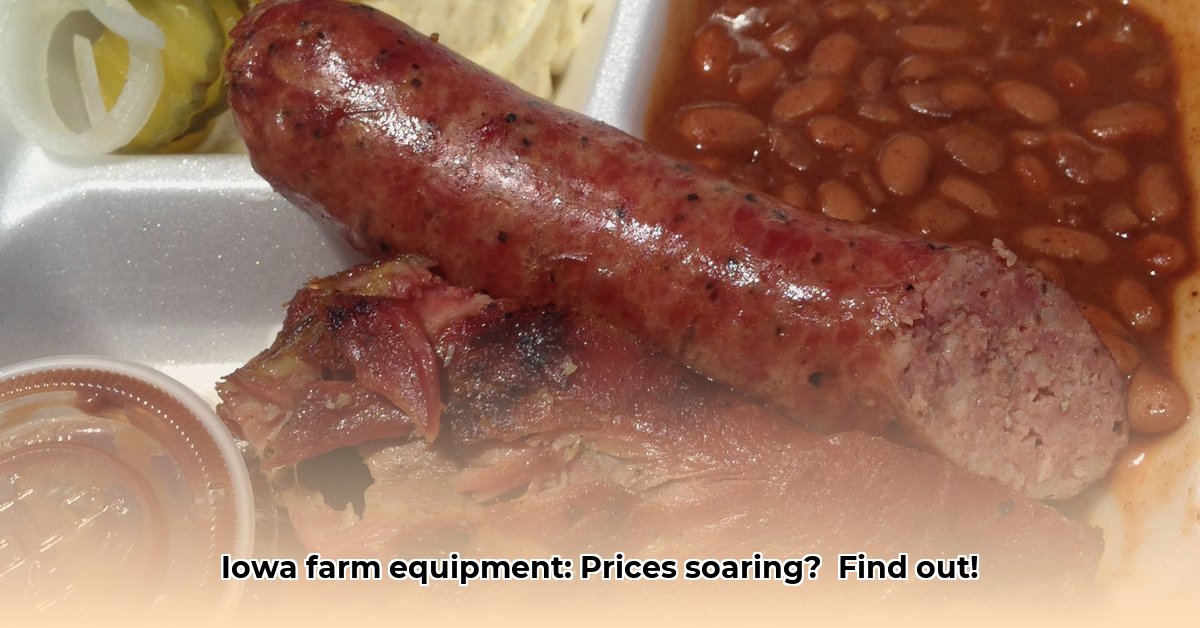
Iowa's Auction Landscape: A Booming Market
The Iowa farm equipment auction scene, particularly at hubs like Joel's Tractors, is experiencing a surge in activity. This robust market reflects broader trends in the agricultural sector, driven primarily by farm consolidation and the retirement of older farmers. One recent Joel's Tractor auction featured a remarkable 125 tractors and over 500 other pieces of equipment – a testament to the scale of this dynamic market. But what are the underlying forces driving this activity, and what opportunities and challenges do they present? For example, see this Massey Ferguson example.
Key Insight 1: Farm consolidation is a major driver of the increased volume of equipment at auction, creating both opportunities and challenges for buyers and sellers.
Farm Consolidation: Shifting Sands in Iowa Agriculture
Iowa's agricultural landscape is undergoing a significant transformation. Fewer, larger farms are replacing the traditional family farms, resulting in a surplus of used equipment. This consolidation is directly fueling the growth of auction houses like Joel's Tractors, creating a highly competitive market ripe with both opportunities and challenges. This market dynamic raises a crucial question: How can buyers and sellers navigate this increasingly complex landscape to maximize their returns?
Quantifiable Fact: A recent Joel's Tractor auction showcased a significant increase in equipment volume, reflecting the ongoing consolidation of farms across Iowa.
Navigating the Risks: Due Diligence in a Competitive Market
While the abundance of equipment at auction presents opportunities, buyers need to approach the market cautiously. The condition of used equipment is paramount – a meticulous inspection is crucial to avoid costly repairs down the line. Beyond the condition of individual machines, logistical considerations also impact the total cost. Transporting heavy farm equipment is expensive and complicated, requiring careful planning and budgeting for transportation costs.
Key Insight 2: Thorough equipment inspections and strategic planning for transportation costs are crucial for successful participation in Iowa farm equipment auctions.
Actionable Insights: Strategies for Success
The Iowa farm equipment auction market presents unique opportunities and challenges for various stakeholders. Here are actionable strategies tailored to each group:
1. Auction Houses (like Joel's):
- Short-Term: Enhance online presence with high-quality photos and detailed descriptions; improve logistics and loading; partner with reliable transport companies; offer equipment condition reports (potentially using third-party inspection services for increased buyer confidence).
- Long-Term: Invest in technology (online bidding platforms, digital condition verification tools); expand reach into new markets; diversify offerings (e.g., equipment rentals, parts sales, financing options); develop robust after-sales support mechanisms.
2. Farmers (Buyers):
- Short-Term: Conduct thorough inspections; obtain multiple transport quotes; network with other farmers to share information; attend pre-auction inspections.
- Long-Term: Plan equipment purchases strategically by assessing long-term needs; explore financing options; budget for maintenance and repairs; build a relationship with trusted mechanics for independent pre-purchase inspections.
3. Farmers (Sellers):
- Short-Term: Use auction house expertise for valuation; provide high-quality photos and detailed descriptions; market equipment beforehand using digital tools and social media; time sales strategically to maximize value.
- Long-Term: Plan farm transitions methodically; consider alternatives like private sales or direct-to-dealer options; potentially pre-sell high-value items independently; explore options for equipment upgrades and modernization.
Key Insight 3: Strategic planning and data-driven decision-making are key to success in this dynamic market, regardless of stakeholder role.
Risk Assessment and Regulatory Implications
Several risks and regulatory considerations impact the Iowa farm equipment auction market:
Equipment Condition: Thorough inspections and mechanic's reports are key to mitigating risks associated with poor equipment condition. Negotiating warranties or guarantees whenever possible is another crucial step buyers should take.
Transportation Costs: Obtaining multiple transport quotes and factoring in potential delays are crucial elements in sound financial planning. Exploiting collaborative shipping opportunities among multiple buyers can lead to significant cost savings.
Market Volatility: Tracking auction trends, diversifying equipment acquisition strategies, and avoiding impulsive decisions are crucial aspects of risk management.
Regulatory Compliance: All stakeholders must remain aware of environmental regulations (proper disposal of old equipment, fuel standards), safety standards for operating machinery, and tax implications. Staying informed through relevant government channels and industry publications is key.
Conclusion: Navigating the Future of Iowa Farm Equipment Auctions
The Iowa farm equipment auction market, exemplified by Joel's Tractors, reflects the broader trends of consolidation and technological change affecting agriculture. Careful planning, thorough due diligence, and a keen awareness of market risks and regulations are crucial for success. By adapting to the changing landscape and adopting the strategies outlined above, stakeholders can effectively navigate this dynamic market and secure profitable outcomes. The future holds both opportunities and challenges, emphasizing the continuing need for adaptability and strategic foresight. Understanding these trends will be paramount for anyone involved in Iowa agriculture.